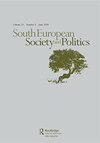‘Your Luck is Our Luck’: Covid-19, the Radical Right and Low Polarisation in the 2022 Portuguese Elections
IF 4.6
1区 社会学
Q1 POLITICAL SCIENCE
引用次数: 0
Abstract
ABSTRACT In the 2022 Portuguese legislative elections, held nearly two years after the pandemic hit the country, the incumbent Socialists improved their position, being now able to govern with an absolute majority, while populist radical right Chega experienced considerable growth. Was the pandemic a relevant factor for vote choice in these elections? The main goal of this article is to shed light on this matter. In addition to portraying this election’s background and results, we describe the degree of COVID-19-related polarisation in Portugal, analyse the salience of the pandemic in the campaign and measure the relative impact of pandemic-related perceptions vs other variables on voting behaviour. Our findings reveal that, although there was little politicisation of the pandemic and the incumbent enjoyed high levels of support among both political elites and public opinion, Chega, which was less involved in rallying around the flag, arguably sent signals that made COVID-19-related assessments relevant in terms of voting behaviour.“你的运气就是我们的运气”:2022年葡萄牙选举中的新冠肺炎、激进右翼和低两极分化
在葡新冠疫情爆发近两年后的2022年,葡萄牙举行了议会选举,执政的社会党(Socialists)的地位得到了提升,现在能够以绝对多数的优势执政,而民粹主义的激进右翼政党Chega则获得了可观的增长。在这些选举中,疫情是否成为投票选择的一个相关因素?本文的主要目的是阐明这个问题。除了描述本次选举的背景和结果外,我们还描述了葡萄牙与covid -19相关的两极分化程度,分析了该大流行在竞选中的显著性,并衡量了与大流行相关的看法与其他变量对投票行为的相对影响。我们的研究结果表明,尽管疫情几乎没有政治化,现任总统在政治精英和公众舆论中都享有很高的支持,但较少参与团结在旗帜周围的切加,可以说发出了信号,使与covid -19相关的评估在投票行为方面具有相关性。
本文章由计算机程序翻译,如有差异,请以英文原文为准。
求助全文
约1分钟内获得全文
求助全文
来源期刊

South European Society and Politics
Multiple-
CiteScore
5.80
自引率
21.20%
发文量
14
期刊介绍:
A leading point of reference for scholars of Southern Europe, South European Society and Politics promotes both comparative and inter-disciplinary analyses, as well as offering innovative single county and sub-national studies. The journal acts as a forum for social, economic, cultural, contemporary historical and political approaches to research on the region, and is particularly keen to sponsor policy–focused studies in all these disciplines. The journal publishes research articles; South European Atlas with election reports and articles on other subjects of topical interest, and an extensive book reviews section, including both review articles and individual book reviews.
 求助内容:
求助内容: 应助结果提醒方式:
应助结果提醒方式:


